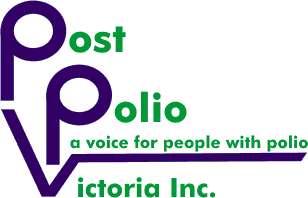Download a PDF version of the following PPV Policy
Accepted by Committee of Management July 2012
Post Polio Victoria fully supports the National Disability Insurance Scheme and wants to make sure that it works well for its membership.
Post Polio Victoria advocates for adequate services for people living with the late effects of polio. We need access to expert services to help us cope with the impacts of having suffered from polio, which include physical impairment (mobility and pain), impacts on employment and family life and psychological impacts on the individual.
We also need financial assistance for:
- orthotics
- mobility aids,
- equipment to assist with living in the community, and
- personal care services for at home care and to continue our work and
- community commitments.
Service providers need to be sensitive to the needs of people from diverse cultures.
Polio and ageing
As many of us have got older, we have joined a new and growing cohort of the Australian ageing population, those who have lived for decades with long-term disabilities (AIHW, 20001; ABS, 20102). People ageing with physical disabilities3 want to continue to live in their communities and realise their vocational, recreational, family and social potential. People living with the after effects of polio, as well as ageing, face four problems: progression of our impairments that is post-polio syndrome, age related health conditions, lack of expert advice and potential exclusion from National Disability Insurance Scheme.
Problems with the developing National Disability Insurance Scheme
The prime concern for older people living with polio is the intent and implementation of Recommendation 3.6 of the Productivity Commission’s Report.4 It indicates that at Age Pension age, a person with disability supported by the National Disability Insurance Scheme, should be given ‘the choice of ‘staying with National Disability Insurance Scheme service arrangements…or moving to the aged care system, where they would be governed by all of the support arrangements of that system.’ That is, they have to opt for one system or the other. However the figure below shows that aged care is a large field. There is no recognition of extra needs for people with disabilities.

Disability by age and sex
(ABS, 2010. p.5)5
There is no magical cure when one reaches a statutory age and disability continues until the end of life. Aged care funding does not offer the same level of support as current disability service programs or planned National Disability Insurance Scheme programs.
Post-polio syndrome has been diagnosed in 40-60% of polio survivors four to six decades after their original impairment.6 People who believed they had full or partial recovery have found renewed weakness and related symptoms. Therefore people who have lived without using disability services for much of their lives, need specialised disability support at a time when National Disability Insurance Scheme may not be available.
Possible solutions
Three suggestions for financing people living with post-polio into middle age and beyond into positive ageing are:
- National Disability Insurance Scheme topping up Community Aged Care Packages or Extended Age Care at Home Packages so people with disabilities can continue with sufficient support to live at home.
- Targeting or reserving National Disability Insurance Scheme funding to specific needs.
- Development of assessment and service models to assist people ageing with polio to manage their dual challenges of living with impairments and age related conditions. The coincidence of increased disabilities and age acquired health conditions, are very difficult to manage without impairment specific medical and professional advice. There are very few health professionals who understand the dual fields of disability and ageing. There is one partially developed model, Polio Services Victoria, which is funded by the Victorian Department of Human Services Ageing Division Sub-Acute Ambulatory Care.
Post Polio Victoria believes the eligibility criteria can be interpreted to assist people living with polio throughout life and believes that National Disability Insurance Scheme support must continue for the individual’s lifetime.
Post Polio Victoria supports the eligibility criteria as defined in the Productivity Commission Report (ie have significant limitations in mobility, communication and self care, and or have an intellectual disability). PPV believes the NDIS should focus on the needs of those who need assistance with mobility and personal care.
PPV will only form alliances with broader based advocacy organizations whose policy does not diminish the support needed by PPV members.
July 2012
Download an Adobe PDF version of this PPV Policy from the following link:
PPV NDIS Policy July 2012
- Australian Institute of Health and Welfare. (2000). Disability and ageing. Australian population patterns and implications. Canberra: AIHW Cat. no. dis. 19. ↩
- Australian Bureau of Statistics. (2010). Disability, Ageing and Carers Australia: Summary of findings. Catalogue 4430 ↩
- Disability is defined here in the same sense as the UN Convention on the Rights of Persons with Disabilities. .. an evolving concept and results from the interaction between persons with impairments and attitudinal and environmental barriers that hinder their full and effective participation in society. ↩
- Disability Care and Support: Productivity Commission Inquiry Report. No. 34. 31/7/11 ↩
- Australian Bureau of Statistics (2010).Disability, Ageing and Carers Australia: Summary of findings. Catalogue 4430. ↩
- Jubelt, B., & Agre, J. (2000). Characteristics and Management of Post-polio syndrome. Journal of the American Medical Association. 284 (4), 412-414. ↩
